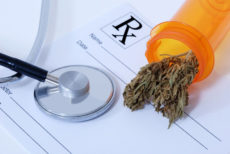Medical Marijuana Saves Taxpayers Money
 In a fascinating article in Health Affairs, Ashley Bradford and David Bradford of the University of Georgia have estimated that medical marijuana has benefited taxpayers:
In a fascinating article in Health Affairs, Ashley Bradford and David Bradford of the University of Georgia have estimated that medical marijuana has benefited taxpayers:
Using data on all prescriptions filled by Medicare Part D enrollees from 2010 to 2013, we found that the use of prescription drugs for which marijuana could serve as a clinical alternative fell significantly, once a medical marijuana law was implemented. National overall reductions in Medicare program and enrollee spending when states implemented medical marijuana laws were estimated to be $165.2 million per year in 2013. The availability of medical marijuana has a significant effect on prescribing patterns and spending in Medicare Part D.
(Ashley C. Bradford and W. David Bradford, “Medical Marijuana Laws Reduce Prescription Medication Use in Medicare Part D,” Health Affairs, 35 (7) July 2016, pp. 1230-1236.)
Let’s not get carried away, here. The Medicare Part D prescription drug program spent $69 billion on benefits in 2013, of which $59 was funded by taxpayers (not premiums). So, medical marijuana is making an insignificant dent in the burden of this entitlement.
Nevertheless, there are some lessons to be learned. Allowing states the freedom to legislate controversial issues like medical marijuana (instead of the federal government overriding states’ general police powers) has benefits. Sure, it allows laws to be made by a government that is closer to its people than Congress is. However, it also allows information to emerge because scholars can observe and assess different outcomes in different legal regimes. Once Congress acts to impose one rule nationwide, no such information can arise from which the people and legislators can learn.
It is also important to recognize that people buy medical marijuana with their own money, not taxpayers’. This research highlights that Medicare Part D entitlement was not necessary for seniors to gain access to medically necessary drugs. Seventy percent of the elderly already had prescription coverage, and $12 of $13 of Part D spending substituted for drug spending that seniors already incurred.
Here’s a question: Some states have saved the federal government money by legalizing medical marijuana. Should those states get some kind of rebate from the federal government for this public service?





